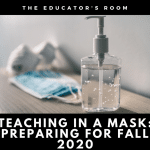Have you signed up for The Educator’s Room Daily Newsletter? Click here and support independent journalism!
The three-year anniversary of the beginning of the COVID-19 pandemic coincides with my birthday. I remember having a school potluck on that Friday, not knowing the very next day that we would be informed that we would not be returning to school for weeks. Of course, weeks turned into months, and months turned into over a year. My “birth” day unknowingly “birthed” our entrance into a new online world. The questions lie in not only what lessons have we learned but what lessons should we have learned from the Pandemic Era of education.
COVID taught us the importance of technology
The pandemic forced many teachers, including veterans like me, to learn how to use Zoom, Remind, virtual chat rooms, online learning management systems like Canvas, and so much more. I heard many testimonials from teachers who had more one-on-one time with their students. But like many, once we re-entered in-person education, I did not use many of the lessons I learned about how technology improved my teaching. In “Education after the Pandemic,” Frederick M. Hess talks about how “Today’s technology gives students, and teachers access to a dazzling array of explanations, illustrations, activities, exercises, and assessments.” As I reflect on the past three years, I find myself wondering if I have gone back to the status quo and missed out on opportunities to continue using technology to diversify my teaching and reach more of my students.
COVID taught us the importance of mental health
In “Teachers Are Experiencing a Mental Health Crisis, Too,” Mira Miller wrote, “Experts say it’s vital that teachers have access to much-needed mental health support both during and after the pandemic.” As a teacher who took the first stress leave of my career during the pandemic, this reality hits home. I was very pleased to see that in our newly ratified contract, our union negotiated mental health as an acceptable reason educators can take a personal day. Other districts should take note of this.
In the same vein, Miller reports, “At least 12 states have adopted some form of “mental health days,” which excuse student absences for mental health purposes.” It is clear, as the Washington Post put it, “The crisis of student mental health is much vaster than we realize.” Covid amplified mental health issues that may have been underlying for years. While some took the opportunity to increase mental health services, we still have not completely addressed the mental health crisis among American school children. The Post discusses the potential effects of this issue in detail. Sharon Hoover, co-director of the National Center for School Mental Health, summed up the challenge well, saying, “We know that when kids are mentally well, they’re much more likely to attend school and do well in school.” We should have seized the opportunity to address the exacerbated mental health struggles our students faced.
COVID taught us the importance of flexibility
The grace, mercy, and patience needed for both students and teachers cannot somehow be put on the back burner now that we are all beginning to settle into a “new normal.” Cases are down, attendance is less sporadic, and the previous atmosphere of inconsistency and disruption has fizzled. Does that mean we should forget about the flexibility we relied so much on when we needed it the most? Easing the hardline due dates for assignments, accepting late work, and offering more than one chance to pass assessments are sample practices that benefited many students. If nothing else, the pandemic amplified the need for these principles that we should have been emphasizing as educators regardless of Covid-19.
Reflecting on Three Years of COVID
I will be the first to admit that the day to day of teaching has made the lessons I learned during the pandemic begin to fade. The struggle of being a teacher can make one use the excuses of lesson planning, grading, and literally just showing up to the daily hustle in this unpredictable system. No matter our reasons, we must not allow the post-pandemic era to become yet another missed opportunity to change the way we do the business of education.
The three-year anniversary of COVID’s arrival in the United States is a time for reflection, not regret. Let’s remember the lessons learned, evaluate the lessons we should have learned, and make permanent changes to improve our craft.
Editor’s Note: If you enjoyed this article, please become a Patreon supporter by clicking here.






